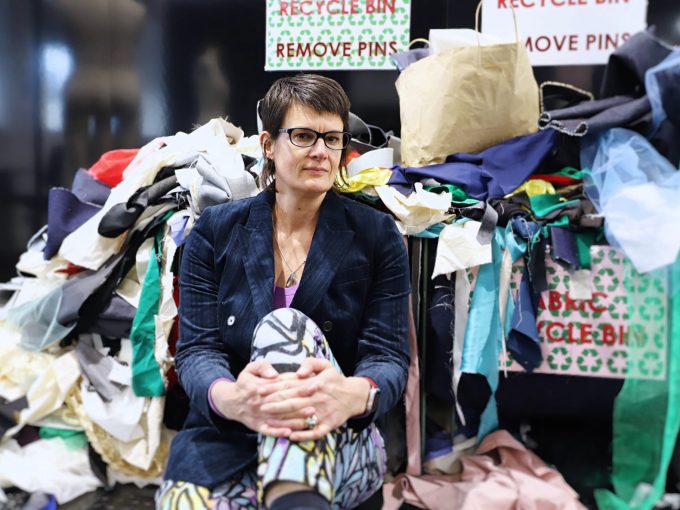RMIT’s academic green team is working to make the University’s ambitious sustainability vision a reality through teaching and research.

Some of our SUPP researchers (clockwise from left): Bhavna Middha, Irvan Bastian Arief Ang, Wei Shao, Matthew Francis, Hui Song, Allister Hill, Andrew Glover.
The research leaders and PhD candidates involved with the Sustainable Urban Precincts Program (SUPP) – Australia’s largest tertiary education infrastructure renewal project – are an integral part of delivering on its bold targets.
SUPP aims to radically cut RMIT’s energy and water use, reducing electricity use over eight years by an estimated 239 million kilowatts (leading to a 30,000-tonne reduction in greenhouse gas emissions) and slashing water use by about 68 million litres.
In a world-first, both research and education projects are integrated into the project to give students and staff the opportunity to contribute and learn from this once-in-a-generation program.
As well as investing in infrastructure renewal across the University’s three Melbourne campuses, SUPP is also providing $4.8 million in funding to support teaching and research, including 13 PhD scholarships.
The research projects are:
Buildings Engineered for Urban Sustainability Leader: Associate Professor Sujeeva Setunge PhDs: Hui Song, Kanishka Atapattu and Matthew Francis This project aims to increase the current understanding of the performance of green building retrofits in hopes to generate new knowledge measuring gaps between expected and actual performance.
Inhabiting Buildings Leaders: Dr Tania Lewis and Dr Yolande Strengers PhDs: Bhavna Middha, Allister Hill With the aim of embedding sustainable practice into RMIT’s culture, this research seeks to use the University as a living laboratory to delve its organisational culture, process and operations and achieve transformations in practices through scientific-based inquiry.
Powering Future Cities Leader: Professor Xinghou Yu PhDs: Kashif Khan, Sami Eusuf and Chaojie Li This research project will improve understanding of how demand response technologies and energy informatics can be employed to influence and achieve greener buildings and positive energy use behaviour.
Enhanced Micro-grid with Sustainable Energy Storage Leader: Professor Grahame Holmes PhD: Anima Ganeshan This project will explore the potential for an enhanced micro-grid with sustainable energy storage to provide short-term peak load levelling within a 4/5 Green Star-rated urban building complex at RMIT.
Infrastructure for iCO2munnity Leader: Dr Flora Salim PhDs: Amin Sadri, Wei Shao, and Irvan Arief Ang To increase self and community awareness of green living behaviours, this project implements a technology solution designed to support RMIT staff and students monitor and compare carbon footprints generated from their work, study and travel activities, with the goal of inspiring university-wide engagement towards greener living.
Trigeneration Energy Project Leader: Dr Abhijit Date PhD: Mitchell Lennard An evaluation of the technical performance of the 150kWe tri-generation system being installed at RMIT’s Bundoora campus west as part of SUPP, assessing its overall economic, environmental and social impacts on a lifecycle basis compared with the alternative of grid electricity and natural gas supply.
The learning and teaching projects are:
The Green Office and Classroom Leader: Dr Margaret Hamilton This project uses RMIT buildings and students as a virtual classroom to design a more sustainable workplace that reduces the University’s carbon footprint into the future. It aims to design social interventions from the analysis of green living monitoring at RMIT.
Electrical Building Lab Leader: Dr Brendan McGrath A new interactive and experimental teaching laboratory for sustainable electrical building service technologies, enabling principles of sustainability in building services to be incorporated into undergraduate and postgraduate electrical engineering programs.
The Greenhouse Challenge Leader: Professor Julianne Reid This project aims to create innovative solutions to the global problems of sustainability and greenhouse effects by engaging students via Work Integrated Learning opportunities to resolve real-world issues as part of their capstone projects.
Showcasing IT for Sustainability Leader: Dr Alem Molla With information systems developers playing a significant role in how modern organisations operate, this project aims to address the importance and design of IT-enabled environmentally sustainable organisational practices.
Navigating a “Fierce Planet” Leader: Dr Nicole Pepperell “Fierce Planet” aims to augment sustainability learning through gaming and simulation to assist RMIT to foster creative ways of learning, teaching and thinking about rich sustainability themes in their curriculum.
Originally published on RMIT News.





